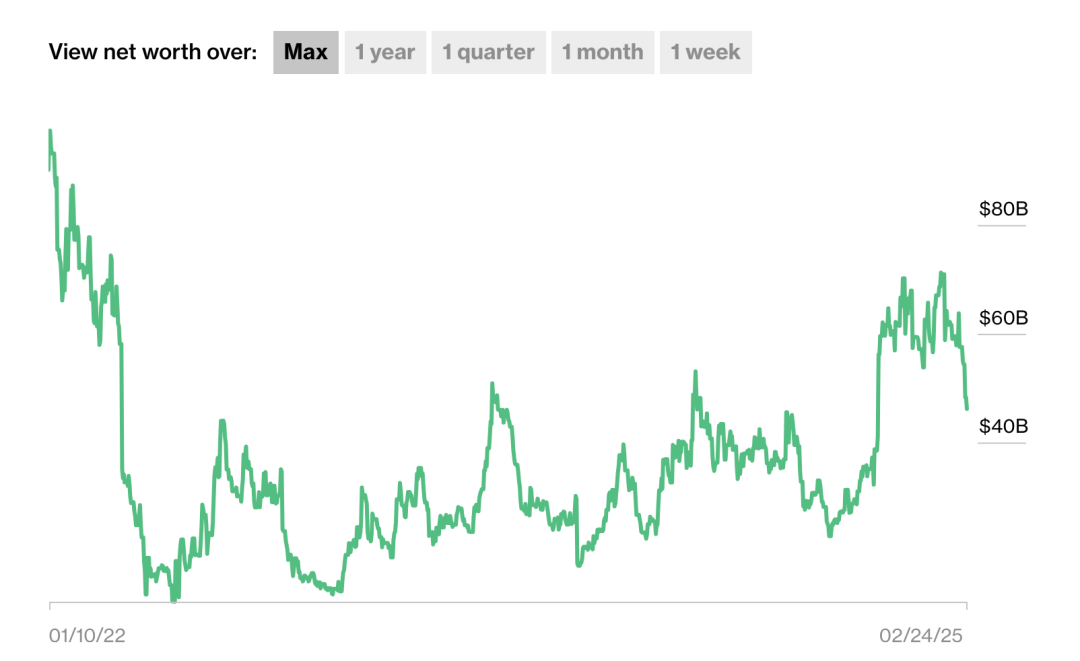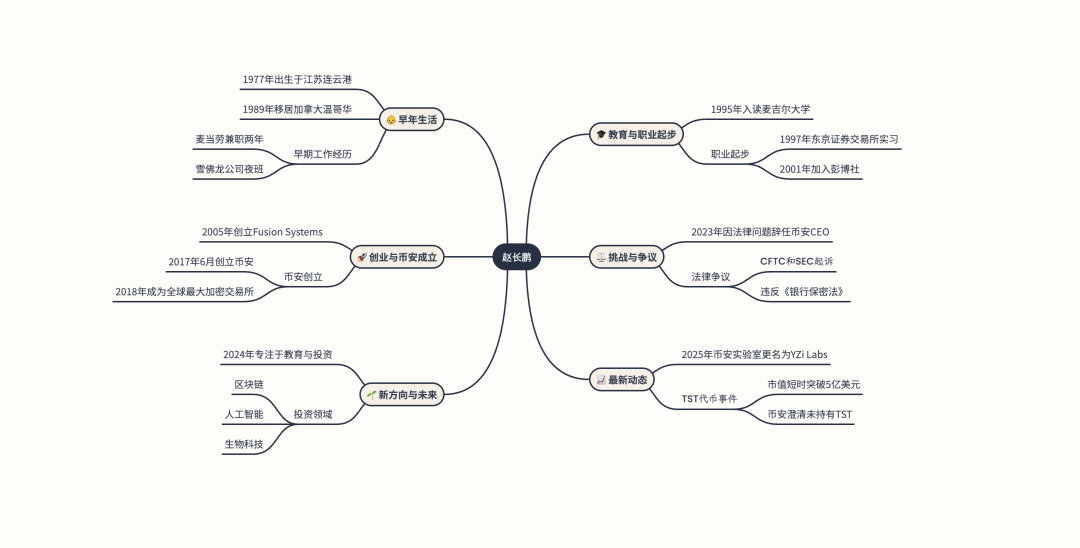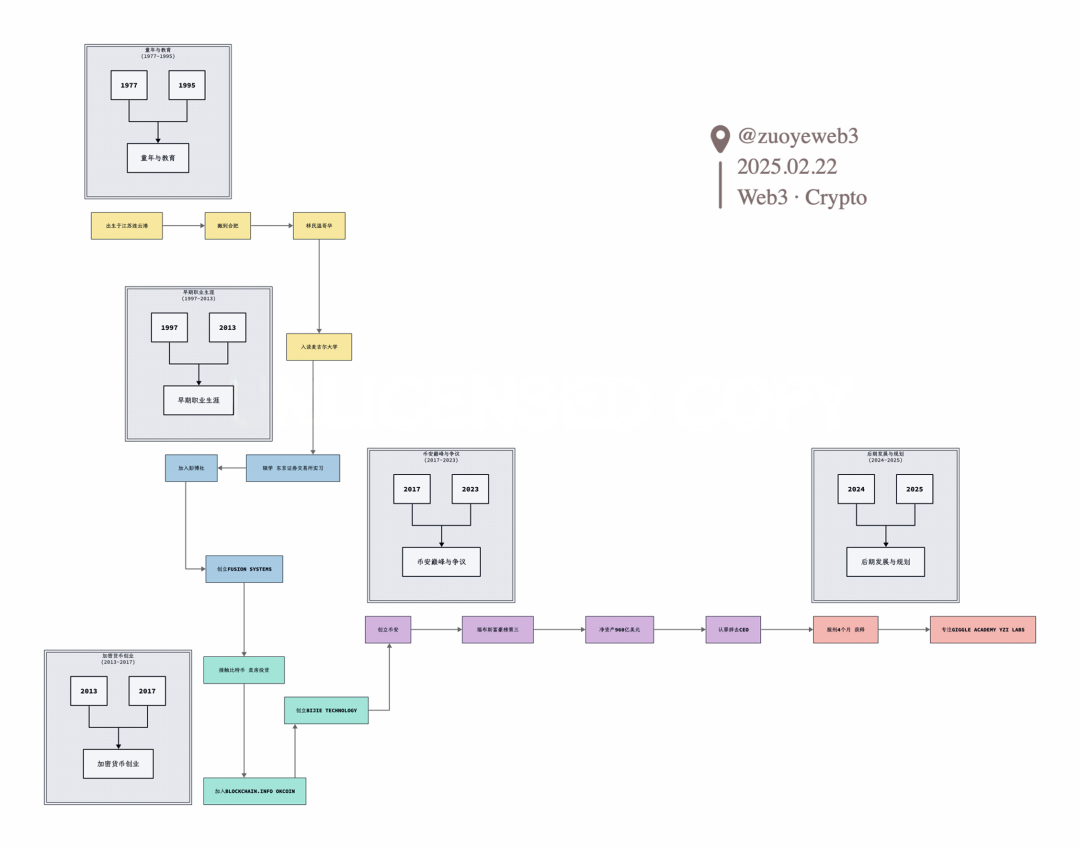Author: Zuoye
Half Devil, Half Child
The formalist thinking of the 19th century has always been based on atomistic individualism;
The globalist thinking of the 20th century has always been based on collective liberalism;
The isolationist thinking of the 21st century has always been based on fragmented Occidentalism.
In 2021, CZ was interviewed by LatePost, and in the complex intersection of Binance's de facto global number one and its obscurity in the eyes of the Chinese, the LatePost team gave the most objective expression of the crypto world and Binance by traditional commercial and financial media so far, the public thus recognized Binance and CZ, and then I left ByteDance to start my Web3 journey, until now.
Regarding CZ's personal, the biggest difference is the contrast with Justin Sun. If Justin Sun is becoming more and more personified under the green leaves of Bao'er, Li Xiaolai and Xue Manzi, then CZ's counterparts should be Armstrong of Coinbase and SBF of FTX, but neither Justin Sun nor CZ are fellow travelers of Satoshi Nakamoto and Vitalik, that is, it is difficult to say that CZ believes in the ideology behind blockchain - decentralization is just a technical manifestation, but in fact it is neoliberalism and anarchism.
As the title of LatePost in 2021 "Dialogue with Binance's CZ: In the Middle Ground of Cryptocurrency", CZ himself is in between decentralization and centralization, CEX and DEX, East and West, where is his final destination, Bloomberg, OK, Binance, or perhaps He Yi.
Let's indulge in the possible nights together.
Life Arbitrage
Individualism is not the mainstream today, nationalism and de-globalization have gradually recovered since 2018.
But individualism is precisely the spiritual banner of the migration of old Europe to the New World, the only choice for the bottom-level poor to restart their lives, the spiritual continuation of the Chinese immigration wave after the 1980s, unlike the survival-seeking migration to Southeast Asia, the indentured Chinese laborers of the late Qing Dynasty, starting from Li Zhengdao's scholarship to the US in 1979, in the name of studying physics to go to the US and Europe, was the zeitgeist of the intellectual class at the time, just like today's US undergraduate, US master's, and Ivy League CS.
CZ's father was a grain of sand in the background of the times, after the classic three-stage theory of rightist - down to the countryside - back to the city, he entered the doctoral program of geophysics at UBC, and in 1989, the 12-year-old CZ began his life in Vancouver, as one of the earliest batch of overseas students.
At that time, the future Chinese billionaire was experiencing the hardships of the world in a fast food restaurant.

Caption: CZ's wealth changes, image source: Bloomberg Billionaires Index
The not-so-good 20th century came to a rapid end, World War I and World War II shaped the Western-centric pattern, the victory of the Cold War shaped the American-centric world pattern, but all this was based on the stark contrast between the West having collective freedom and the non-West and the Third World having no freedom.
CZ's ultimate choice to conform to the American rules may be driven by childhood memories, as long as he pays the price of becoming a part of the West, he naturally has freedom.
And so, after six years in the materially poor but spiritually rich Vancouver, in 1995 he entered McGill University, first studying biology, then switching to computer science, the spiritual state of a person around the age of 18 is unusually active, perhaps the source of CZ's current great interest in the DeSci paradigm dominated by biotechnology.
In 1997, the 20-year-old CZ came to the Tokyo Stock Exchange for a mundane summer internship, but the same choice as the billionaire appears - imitating Bill Gates, dropping out, All in Code.
If college is beneficial, then go, if development is interesting, then do it. It must be said that CZ did indeed do well, and in 2001, four years later, he joined Bloomberg to develop trading software, and in 2005, at the age of 28, CZ resigned from Bloomberg and, under the influence of the gradual Chinese returnee entrepreneurial wave, naturally chose to move to Shanghai.
The years of accumulated trading system experience now became the direction of entrepreneurship, founding Fusion Systems, in short, this is a company providing high-frequency trading SaaS systems, remember this, this is actually the origin of Binance, that is, to provide the highest quality trading services.
And then there was no more, everything calmed down, obviously CZ is not the version son of this era, this is the era of Li Yanhong, Ma Huateng and Ma Yun, the heyday of Copy to China, when Alipay was still weak, when the Chinese had not yet produced a large number of middle class from real estate and the Internet.
The lack of speculators, ordinary individuals and high-frequency trading obviously cannot establish a connection, and SaaS systems, 2B and 2G are the mainstream, I think it was during this time that CZ left the memories of Shanghai and China that could only survive with alcohol, but everything is just a touch, without directly pointing out the complaints about China, just like now about TST, no shilling, just riding the concept.
So it went on quietly until the collapse of the tower, after passing the age of 35, CZ, who had already become a boss and had a house in Shanghai, began to gradually evolve into CZ, and met He Yi, who constituted the other half of Binance, turning from arbitrage to long-term Buidl Binance.
By the way, CZ went through the first and only "marriage" of his life during this period, and Star Xu once had doubts about his personal resume, the truth and falsehood are also the norm of life, let's just take it all as true.
h2>Isomers
How to evaluate CZ's life before the age of 35? It's certain that he doesn't have the ability to make a fuss like Justin Sun, unlike Justin Sun's rapid growth with drumbeats, CZ is more like a natural accumulation of a solid foundation, from his personal emphasis on opportunities rather than degrees and wealth, from the resilience forged in the rolling waves of the times, now he just lacks an industry, a partner and an opportunity.
The experience in Canada and Tokyo, as a returnee buying a house, escaping the ordinary life of a commoner, under the double buff of China and the Internet, after the real estate flood in 2008, belongs to the era of the financial frenzy of P2P and blockchain, 2013-2018 came to us.
Occidentalism has existed from the beginning of this century to before the Sino-US account reconciliation on Little Red Book, all material and spiritual things related to the West have a halo, reviewing the "self-Orientalization" in the crypto narrative, for better or worse, the world will always be more tolerant of them, but this is not always the case, the Binance night run in 2017, the collapse of FTX in 2022, both East and West are purging all the elements of the old era.
In 2013, a late-night poker game, Li Qiyuan introduced Bitcoin to CZ, it's hard to understand why he would then sell his house for $100 million to go all in on Bitcoin, a more plausible guess is that he saw the entrepreneurial opportunity in the trading aspect, and the image of going all in by selling the house, like the Chen Sheng Wang in the fish belly, the Stone Man of the Yellow River, and the Red Light of Zhu Yuanzhang's birth, belongs to the mythical history rewriting after success, everyone can just take a look.

Caption: CZ's life blocks, image source: @zuoyeweb3
Subsequently, CZ left Fusion Systems and joined Blockchain info company, just as Ripple meant to Justin Sun, CZ as a technician got involved.
The past is just a life experience, not an unbearable burden, CZ changed his life trajectory again by withdrawing from entrepreneurship to learn new and unfamiliar fields, as always floating among various companies.
The key is that CZ met He Yi, and CZ was thus born.
Here is the English translation, with the content inside <> retained without translation:In 2014, the two co-founders of Binance officially met. At the enthusiastic invitation of He Yi, CZ left his job and joined OKex, the current OKX, as the technical lead. At the time, Reddit became his main platform for passionate promotion of OKX and all things crypto. Of course, whether his social media obsession affected his development work is unknown.
In 2015, CZ left OKX to start his own business. There is too much personal emotion involved between CZ and Star Xu, Binance and OKX, so it's more interesting to focus on the business competition rather than prying.
Afterwards, Bitzlato was established. Strictly speaking, Bitzlato fueled the first crypto bubble in China, as it was another SaaS company selling "white label" exchange systems. The subsequent "Thousand Exchanges War" was essentially just these SaaS white label companies profiting.
This should be CZ's real source of wealth growth, not his previous All In on BTC and startups.
"The most vibrant successful enterprises are those that stand on the edge of chaos and are not constrained by order."
Unlike the well-known origins of Binance in 2017, Bitzlato's two main pillars were the crypto exchange business and the philatelic/numismatic/phone card trading platform. The latter was even more significant, a hybrid of physical NFTs, tulips, and tokens that could not last.
Thus, in January 2017, Bitzlato lost one of its two legs, as the philatelic/numismatic exchange nearly disappeared in August. But at the same time, cryptocurrencies seized the opportunity to grow. CZ then had two paths: the first was to do 2C, but he had almost no experience running an exchange; the second was to continue doing 2B, but his imagination was far inferior to the exchange SaaS platform.
He needed a person, someone who could win the "Thousand Exchanges War".
After leaving OKX, He Yi joined Inke, signing the hot celebrity Song Joong-ki. Regardless of praise or criticism, He Yi is one of the best CMOs of this era in China, not limited to the crypto industry.
Binance was founded in June 2017. The wheel of fortune turned, and in July, it was He Yi joining CZ's company, becoming increasingly urgent. After 9/4, following Justin Sun, Binance migrated from Alibaba Cloud to AWS, and CZ moved back from China to Tokyo.
In the US, Armstrong's Coinbase also gradually grew into a towering giant. But obviously, the purchasing power of Chinese people was first manifested, and Binance's offshore mechanism was more flexible. The dual track of China and abroad created the miracle of becoming the global No. 1 in 165 days.
In 2018, CZ entered the Forbes Crypto Rich List with a net worth of up to $2 billion, which is about 2% of the $96 billion in the Bloomberg Billionaires Index in 2021.
From 2017 to 2021, two bull markets allowed Binance and CZ to achieve unparalleled crypto success, no longer embroiled in frantic legal battles with investment institutions or the embarrassment of failing to sell platform tokens.
Looking at the history of disruptive technology development, the dominant player in a field can never continue to reign on the next generation of platforms.
This is what SBF thought. In 2022, FTX was at its peak. The American background also made FTX stand out, with Temasek and Middle Eastern sovereign wealth funds, as well as Silicon Valley and Wall Street, highly optimistic about the altruistic SBF, whose parents were Stanford law professors and who embodied the old American flag. In contrast, the globally drifting Binance, the fence-sitting CZ, and the non-English-speaking He Yi - it seemed FTX was destined to win.
The two giants fought, but the result was killing the enemy at the cost of heavy self-damage. FTX collapsed in 2022 due to misappropriation of user assets and insolvency, with SBF jailed after the game. In March 2023, CZ was indicted by the US, and after a protracted legal battle, he resigned as CEO, went to jail, and no longer managed Binance, fined over $4 billion.
The verdict was announced in April 2024, and he was released in late September, the charge being the well-known anti-money laundering clause.
After paying the fine and serving his sentence, he smoothly embarked on a second spring. How high was the cost for Binance to land safely?
47-year-old CZ is now a father of three, and He Yi has also become a mother of three. After a lifetime of ups and downs, they have finally found their place - a $100 billion apartment in the UAE.
CZ's Comeback, BNB's Revival?
In 2024, CZ appeared in Dubai, restarting at the 2024 Binance Blockchain Week, announcing a focus on the Giggle education platform serving the K-12 population in global underdeveloped regions, as well as making investments, mainly in blockchain, biotech, and AI.
Rome conquered the world with military power, Greece with intellectual power, or the three teachings with emotional power - it's all the same. The key is how to conquer the world, and CZ has given his answer: reviving the BNB ecosystem. Whether it's investments or public chains, it will be empowered around BNB. CZ announced his own holdings, 98% in BNB, so the rumor of 1 million All In on BTC may be true, but only 1 million.
It now appears that the dual-engine of BNB Chain and the renamed YZi (formerly Binance Labs), empowering BNB Chain with Meme and AI Agent, investing in Vana as an advisor to educate the global P-players, and collaborating with Vitalik on longevity-oriented DeSci, is the main focus.
I've always believed that the crypto industry is a content creation industry. It's hard to see a company, after becoming big, have its founder like Ma Huateng chat with QQ users, or have interns' private messages to Ma Huateng become trending topics. Hierarchy is the standard in modern society, regardless of left or right.
But in the crypto industry, endless creativity is monetized through tokens, NFTs, and Memes in the form of DAG/BFT/ZK/FHE/AI Agent, with a rapid rise and fall, waiting for the next "more lively" person to take the lead for a few years.
It must be admitted that before CZ and Armstrong, crypto trading was always constrained by traditional tech hedonism, just a toy for a few geeks to play with. It was only after CZ's Binance that cryptocurrencies expanded to today's scale. He may not be the creator, but he is definitely the accelerator.
However, the more successful one becomes, the harder it is to find one's own meaning of existence. The reason may be that success isolates a person from the real social world.
The CZ we see now cannot use a wallet, cannot play Meme - this is a symptom of success. He has a bit of an old money vibe. He no longer shares the same stratum as ordinary crypto users. In terms of his preferences for a life of wealth, he has essentially retained the temperament of a barbarian, only with more cunning or management skills to replace the barbarian's earlier love of physical harm.

Caption: CZ's Timeline, Image source: @zuoyeweb3
CZ's cleverness lies in "using the West to oppose crypto, and using crypto to counter the West." Using decentralization as bait, he ultimately achieved his wealth accumulation through CEX, leaving a $50 million fine for OKX in the wind.
According to Bloomberg, CZ personally owns 90% of Binance's shares. With rumors of selling part of his shares, it would actually turn his shares into real cash flow, which may be more beneficial for the BNB family. But these are just outsiders' perceptions.
Don't worry about those BNBs. The P-players need to be friends with the cycle, not friends with the old money. In the face of a new cycle, the volatile market will quickly erase the experience advantage of the old money, which is also the charm of Web3.







